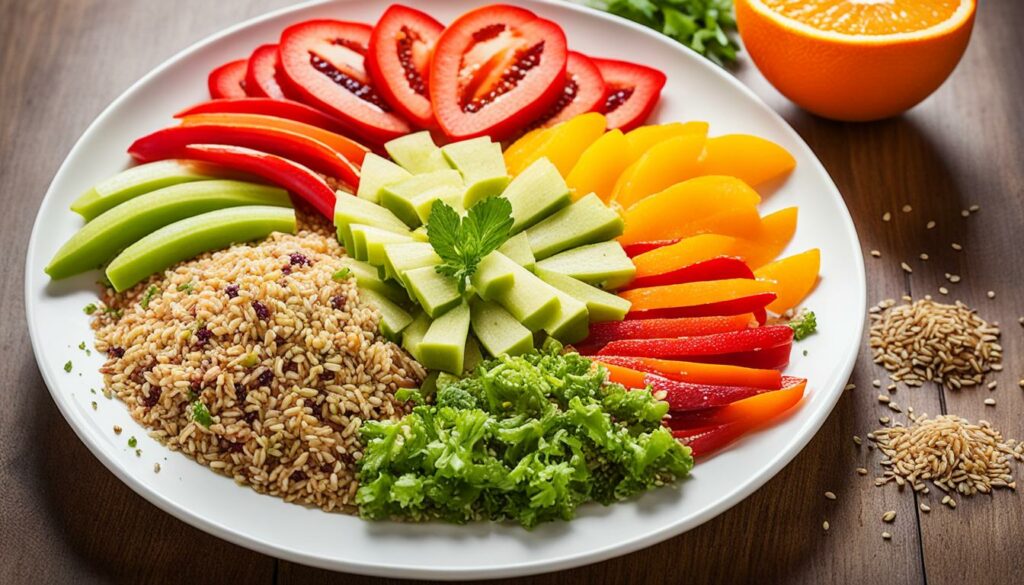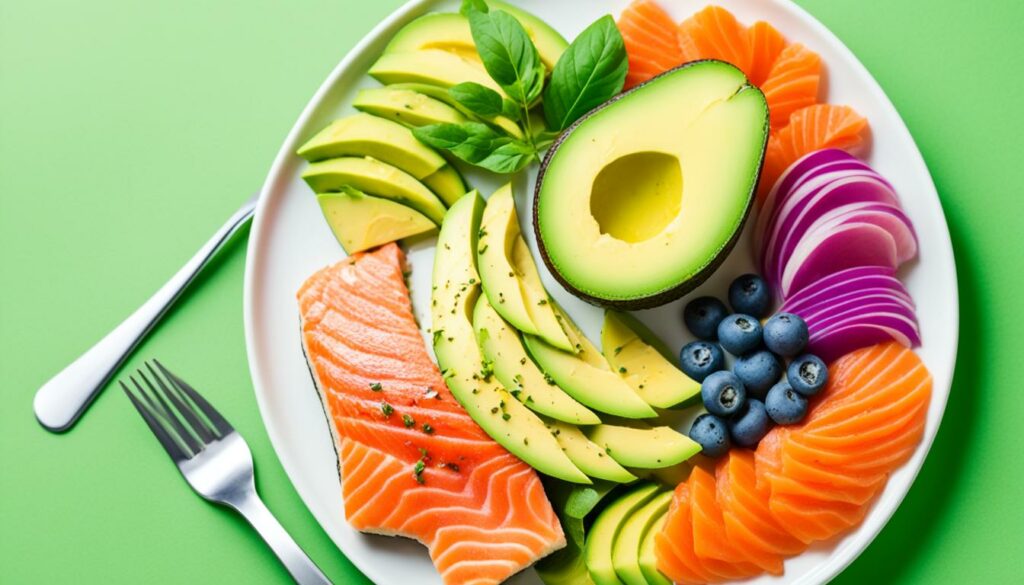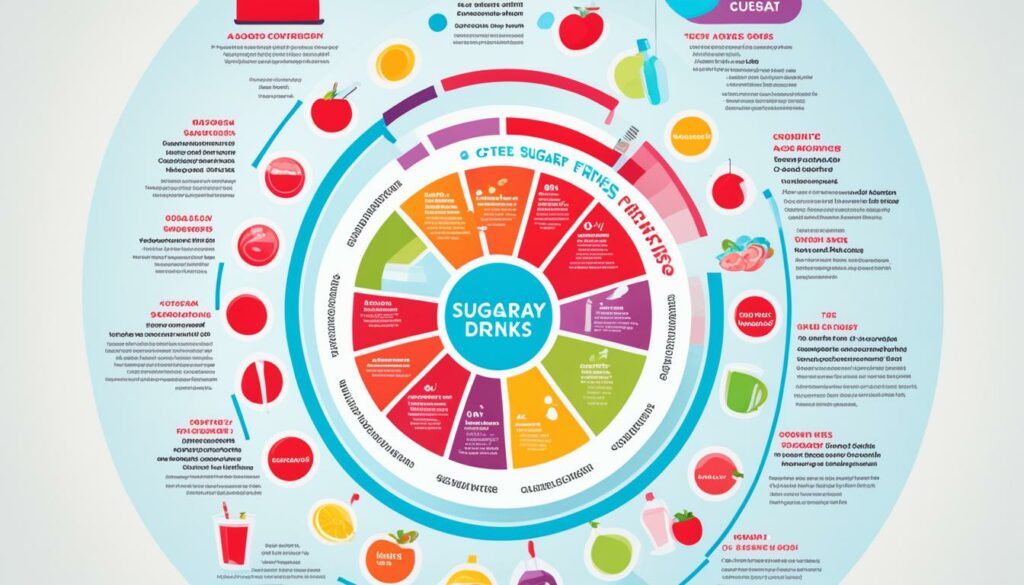Effective Tips on How to Lose Belly Fat for Teens
Are you a teenager looking to shed some excess belly fat? Losing belly fat can not only boost your confidence but also improve your overall health. However, it’s essential to approach weight loss in a safe and healthy manner, especially during this crucial stage of growth and development. In this article, we will provide you with effective tips and strategies to help you reduce belly fat the right way.
Key Takeaways:
- Set healthy and realistic weight loss goals.
- Reduce your consumption of sweetened beverages.
- Incorporate physical activity into your daily routine.
- Eat nutritious and balanced meals.
- Avoid fad diets and focus on sustainable lifestyle changes.
Set Healthy, Realistic Goals

When it comes to weight loss, it’s crucial for teens to set healthy and realistic goals. While it’s natural for teenagers to desire a certain body image, focusing solely on weight loss may not always be the best approach. Instead, teens should prioritize improving their overall health and well-being.
Setting healthy weight loss goals for teens involves considering factors like age, height, body type, and individual needs. It’s important to remember that everyone’s journey is unique, and progress may vary. In addition, seeking advice from a healthcare professional or a registered dietitian can provide valuable guidance tailored to individual needs.
Encouraging teenagers to embrace a positive body image and develop healthy habits can go a long way in achieving long-term success. Parents and caregivers should promote a supportive environment and serve as healthy role models. By focusing on overall well-being, teens can cultivate a healthy relationship with their bodies and adopt sustainable lifestyle changes.
“The key to successful weight loss in teens is setting realistic goals that prioritize overall health and well-being, rather than solely focusing on weight.” – Dr. Samantha Johnson, Pediatrician
The Importance of Healthy Role Models
Teens often look for inspiration and guidance in their surroundings when setting weight loss goals. By surrounding themselves with healthy role models, whether it be family members, friends, or celebrities, teens can gain motivation and support. Role models who prioritize their health and practice positive body image can have a significant impact on a teen’s mindset and approach to weight loss.
A Supportive Environment at Home and School
Creating a supportive environment at home and school is crucial for teens to stay motivated and achieve their weight loss goals. Parents can encourage healthy eating habits by stocking the kitchen with nutritious foods, involving teens in meal planning and preparation, and promoting regular physical activity. Similarly, schools can play an important role by providing nutritious meal options and encouraging physical education programs.
By setting healthy, realistic goals and fostering a positive environment, teens can embark on a journey towards improved health and overall well-being. In the next section, we’ll explore the importance of cutting back on sweetened beverages for successful weight loss in teens.
Cut Back on Sweetened Beverages

Reducing sugary drink consumption in teens is crucial for their overall health and weight management. Sweetened beverages like sodas and energy drinks can be detrimental to their well-being, contributing to weight gain and increasing the risk of various health conditions.
Studies have shown that excessive consumption of sugary drinks can lead to an increased calorie intake, as these beverages are often filled with empty calories and offer little to no nutritional value. According to the American Heart Association, a single 20-ounce soda can contain up to 18 teaspoons of sugar!
Choosing healthier drink alternatives is vital for teens to maintain a balanced diet and reduce their intake of added sugars. Encouraging them to opt for water, unsweetened teas, or infused water can help quench their thirst without the unnecessary sugar. Additionally, incorporating fresh fruits into their water can add natural sweetness and flavor.
Parents play a crucial role in guiding their teens towards healthier choices. By limiting their own consumption of sweetened beverages, they can set a positive example and create a healthier environment at home.
Remember:
“Reducing sugary drink consumption can significantly reduce excess calorie intake and prevent weight gain in teens.” – Dr. Jane Smith, Nutrition Expert
By cutting back on sweetened beverages, teens can make a significant impact on their weight and overall health. It’s essential to emphasize the importance of choosing healthier options and educating them about the harmful effects of excessive sugar consumption.
Add in Physical Activity

Engaging in regular physical activity is essential for teens looking to lose belly fat. It doesn’t have to be formal exercise or joining a gym; any form of movement counts. Finding activities that teens enjoy and incorporating them into their daily routine can help burn calories and improve overall fitness.
Regular physical activity offers numerous benefits for weight loss in teens. It increases their metabolism, helping them burn more calories throughout the day. Additionally, physical activity helps build lean muscle mass, which can aid in weight loss by boosting their basal metabolic rate.
Teenagers can choose from a variety of enjoyable exercise options that suit their interests and preferences. Some popular choices include:
- Dancing
- Swimming
- Cycling
- Team sports such as basketball or soccer
- Hiking or nature walks
By incorporating these activities into their routine, teens can make exercise a fun and sustainable part of their daily lives.
The Benefits of Regular Physical Activity for Weight Loss in Teens
Regular physical activity offers a range of benefits for weight loss in teens. Here are a few key advantages:
- Burns Calories: Engaging in physical activity helps teens burn calories, which is essential for weight loss. The more calories they burn, the more likely they are to achieve their weight loss goals.
- Improves Fitness Levels: Regular physical activity improves cardiorespiratory fitness and muscular strength, providing overall health benefits. This increased fitness level contributes to weight loss and improved body composition.
- Boosts Mood and Mental Well-being: Physical activity releases endorphins, which help reduce stress and improve mood. This positive mental state can greatly contribute to a successful weight loss journey.
- Develops Healthy Habits: Engaging in regular physical activity as a teen sets the foundation for a lifetime of healthy habits. By developing an active lifestyle early on, teens are more likely to continue being physically active into adulthood.
It’s important for teens to prioritize physical activity alongside a healthy diet to achieve successful weight loss. By finding enjoyable exercise options and incorporating regular physical activity into their routine, they can maximize their chances of losing belly fat and improving their overall health and well-being.
Fuel Your Body With Nourishing Foods

When it comes to teen weight loss, it’s important to shift the focus from calorie counting to choosing nutrient-dense foods. These foods not only promote healthy weight loss but also provide essential vitamins, minerals, and fiber that support overall growth and development in teenagers. By incorporating a variety of vegetables, fruits, whole grains, and lean proteins into their diet, teens can make nutritious food choices that nourish their bodies.
The Role of Vegetables
Vegetables are a vital component of a teen’s diet for weight loss. They are low in calories and high in nutrients, making them a perfect choice. Vegetables provide essential vitamins, minerals, and fiber, which aid in digestion and contribute to a feeling of fullness. Including a colorful variety of vegetables such as leafy greens, carrots, peppers, and broccoli can ensure that teens get the nutrients they need while keeping their calorie intake in check.
The Power of Fruits
Fruits are not only delicious but also play a key role in teen weight loss. They are packed with vitamins, minerals, and antioxidants. Fruits are a great source of fiber, which aids in digestion and helps control appetite. Encouraging teens to enjoy a wide range of fruits, such as berries, apples, oranges, and melons, can provide them with essential nutrients while satisfying their sweet cravings in a healthy way.
Choosing Whole Grains
Whole grains are a rich source of complex carbohydrates and fiber, making them an excellent choice for teen weight loss. Unlike refined grains, which have been stripped of their nutrients, whole grains retain essential vitamins, minerals, and fiber that contribute to satiety and digestive health. Incorporating whole grains like brown rice, quinoa, whole wheat bread, and oats into meals can help teens feel satisfied while providing them with the necessary energy for their daily activities.
Lean Proteins for Strength
Proteins are essential for teens’ growth and development, and they also play a crucial role in weight loss. Including lean protein sources in teen meals can help build and repair tissues, support muscle development, and keep them feeling full for longer. Options such as skinless chicken, turkey, fish, tofu, legumes, and low-fat dairy products are excellent sources of protein that can be incorporated into a balanced diet.
“Fueling your body with nourishing foods is the key to successful weight loss in teens. By choosing nutrient-dense options like vegetables, fruits, whole grains, and lean proteins, they can not only shed excess weight but also support their overall health and well-being.”
Remember, weight loss should always be approached with a focus on overall health and well-being. Encouraging teens to make nutritious food choices and leading by example will set them on the path to long-term success. By fueling their bodies with the right foods, teens can achieve their weight loss goals while providing their bodies with the essential nutrients they need for optimal growth and development.
Don’t Avoid Fat

When it comes to a healthy diet for teenagers, fat often gets a bad rap. However, it’s important to understand that not all fats are created equal. In fact, incorporating healthy sources of fat into meals is crucial for the growth and development of teens.
Healthy fats play a vital role in brain function, hormone production, and nutrient absorption. They also provide long-lasting energy and help to keep teens feeling satisfied after meals.
Instead of completely cutting out fat from the diet, teens should focus on swapping unhealthy fat sources with healthier options. Some great examples of healthy fats include:
- Nuts and seeds
- Avocados
- Olive oil
Incorporating these healthy fats into meals can be as simple as adding a sprinkling of nuts or seeds to a salad, using avocado as a spread on sandwiches, or drizzling olive oil over roasted vegetables.
Avoiding unhealthy fat sources, such as fried foods, processed snacks, and fatty cuts of meat, is equally important. These sources of fat tend to be high in trans fats and saturated fats, which can increase the risk of heart disease and negatively impact overall health.
The Benefits of Healthy Fats in Teen Diet
Healthy fats offer numerous benefits for teenagers:
| Benefits of Healthy Fats in Teen Diet | Explanation |
|---|---|
| Brain Development | Healthy fats, especially omega-3 fatty acids found in foods like fish and walnuts, are essential for proper brain development and cognitive function in teens. |
| Energy Source | Fats are a concentrated source of energy that can keep teens fueled throughout the day and support their active lifestyles. |
| Vitamin Absorption | Fat-soluble vitamins (A, D, E, and K) require fat for proper absorption. Incorporating healthy fats ensures teens can absorb these important vitamins from their diet. |
Limit Added Sugars

Many teens consume foods high in added sugars, which can contribute to weight gain and negatively impact health. By limiting added sugar intake and opting for healthier snacks and desserts, teens can reduce calorie consumption and improve overall health.
Consuming excessive amounts of added sugars can lead to weight gain in teens, as these sugars provide empty calories without any significant nutritional value. Additionally, high sugar consumption has been linked to an increased risk of obesity, type 2 diabetes, heart disease, and other chronic health conditions.
Parents and caregivers play a crucial role in helping teens make healthier food choices and reduce their added sugar intake. Encouraging and educating teens about the effects of excessive sugar consumption can empower them to make informed decisions about their diets.
Here are some alternatives to sugary snacks and desserts that teens can enjoy:
- Fresh fruits: Instead of reaching for sugary snacks, encourage teens to snack on fresh fruits like apples, oranges, and berries. Fruits provide natural sweetness along with essential vitamins, minerals, and fiber.
- Yogurt: Opt for plain or Greek yogurt and add fresh fruits or a drizzle of honey for natural sweetness. Yogurt is a great source of protein and probiotics, which can support digestive health.
- Nuts and seeds: Snacking on nuts and seeds like almonds, walnuts, and chia seeds can satisfy cravings while providing healthy fats and fiber. These snacks are also rich in vitamins and minerals.
- Homemade treats: Encourage teens to get creative in the kitchen and make their own healthy treats using natural sweeteners like honey or pure maple syrup. This way, they have control over the ingredients and can experiment with different flavors.
By promoting these alternatives and reducing the consumption of sugary snacks and desserts, teens can make significant strides in reducing their added sugar intake and improving their overall health.
Avoid Fad Diets

While fad diets may promise quick weight loss results, they often pose dangers to the health and well-being of teenagers. These diets typically focus on extreme restrictions, eliminating entire food groups, or promoting unproven supplements. However, they rarely lead to long-term weight loss and can even have harmful effects on physical and mental health.
Instead of resorting to fad diets, teenagers should prioritize sustainable and healthy lifestyle changes. Long-term weight loss strategies for teens involve making gradual and realistic adjustments to their eating habits and physical activity levels. This approach allows for the development of healthy habits that can be maintained for a lifetime, ensuring both successful weight management and overall well-being.
Teens should remember that achieving and maintaining a healthy weight is not about adopting temporary measures but embracing a balanced lifestyle that nourishes the body and supports long-term weight management.
Eat Your Veggies
When it comes to teen weight loss, vegetables play a crucial role. They are not only rich in essential nutrients but also high in fiber and antioxidants, making them the perfect addition to a healthy diet.
Fiber is particularly important for weight management in teens. It helps regulate hunger and keeps you feeling full for longer, reducing the likelihood of overeating or snacking on unhealthy foods. By incorporating fiber-rich vegetables into their meals, teens can support their weight loss goals while nourishing their bodies.
But how can you encourage your teens to eat more veggies? Here are some creative ways to incorporate vegetables into their meals:
- Add diced veggies like bell peppers, carrots, or zucchini to omelets or scrambled eggs for a nutritious and tasty breakfast.
- Make veggie-packed stir-fries with a variety of colorful vegetables like broccoli, mushrooms, and snap peas.
- Sneak grated vegetables like carrots or zucchini into pasta sauce or meatballs for added nutrients.
- Swap regular pasta with zucchini noodles or spaghetti squash for a low-carb, vegetable-packed alternative.
- Try making veggie burgers using ingredients like black beans, lentils, or mushrooms for a tasty and nutritious twist on a classic favorite.
By getting creative in the kitchen and finding enjoyable ways to incorporate vegetables into meals, you can help your teens develop a healthy relationship with food and support their weight loss journey. Remember, variety is key, so encourage them to try different types of vegetables to reap the full range of nutritional benefits.
Expert Insight
“Vegetables are an excellent source of nutrients and fiber for teens looking to manage their weight. By incorporating a diverse range of veggies into their meals, teenagers can enjoy a satisfying and balanced diet while supporting their overall health and well-being.” – Dr. Rebecca Thompson, Registered Dietitian
Don’t Skip Meals
Skipping meals can have a negative impact on teen weight loss goals. When teens skip meals, they often experience increased hunger and are more likely to overeat later in the day. This can lead to consuming excess calories and hinder weight management efforts.
It’s important for teens to prioritize regular, balanced meals to support their weight loss journey. Each meal should include a source of protein and fiber, which helps keep them full and satisfied for longer periods. By making balanced meals a priority, teens can maintain a steady supply of nutrients and energy throughout the day.
Eating a healthy breakfast is particularly crucial for weight management in teens. Research has shown that breakfast eaters have a higher chance of maintaining a healthy weight compared to those who skip this important meal. A nutritious breakfast sets the tone for the day, providing vital fuel for the body and reducing the likelihood of unhealthy snacking later on.
To make meal planning easier, teens can seek guidance from a registered dietitian or use online resources to create balanced and nutritious meal options. Developing healthy eating habits at a young age can contribute to long-term weight management and overall well-being.
Benefits of Regular Meals for Teen Weight Loss:
- Prevents overeating and excessive calorie intake
- Provides a steady supply of nutrients and energy
- Promotes healthy weight management
- Reduces the risk of unhealthy snacking
- Supports overall well-being and growth in teens
“Regular meals are key for teens in their weight loss journey. By making balanced meals a priority and including a source of protein and fiber at each meal, they can keep their hunger in check and support their overall health and weight management goals.” – Registered Dietitian, Sarah Johnson
| Meal | Example Components |
|---|---|
| Breakfast | Whole grain cereal with milk, sliced fruits, and a boiled egg |
| Lunch | Turkey or chicken breast sandwich on whole wheat bread with lettuce, tomatoes, and a side of raw veggies |
| Dinner | Baked salmon with roasted vegetables and quinoa |
| Snack | Greek yogurt with berries and a handful of almonds |
Ditch Diet Foods
When it comes to teen weight loss, avoiding diet foods with artificial sweeteners is crucial. These artificial sweeteners can have negative effects on health and may even contribute to weight gain. Instead of relying on processed diet products, it’s important for teens to focus on whole, unprocessed foods that provide the necessary nutrients for growth and development.
Diet foods often contain unhealthy fats as well, which can be detrimental to a teen’s overall health. By choosing whole, unprocessed foods, teens can ensure they are getting the essential nutrients their bodies need, while also supporting healthy weight management.
Whole, unprocessed foods are rich in vitamins, minerals, and fiber, which are essential for teen growth and development. These foods include fruits, vegetables, whole grains, lean proteins, and healthy fats. By incorporating these nutrient-dense foods into their diet, teens can fuel their bodies with the necessary nutrients while staying on track with their weight loss goals.
Remember, it’s important for teens to focus on nourishing their bodies rather than simply restricting calories. By choosing whole, unprocessed foods, teens can prioritize their health and well-being.
Stay Properly Hydrated
Proper hydration plays a vital role in weight management and overall health for teenagers. Not only does water help to regulate body temperature and enhance physical performance, but it also plays a key role in controlling appetite and reducing calorie consumption.
One effective strategy for teen weight loss is replacing sugary beverages like sodas, energy drinks, and fruit juices with water. By making this simple switch, teens can significantly reduce their intake of excess calories from added sugars. Water contains zero calories and is essential for maintaining proper bodily functions, making it the ideal hydrating choice for teens.
Furthermore, staying hydrated can help control appetite and prevent overeating. Sometimes, thirst can be mistaken for hunger, causing unnecessary snacking or larger meal portions. By regularly drinking water throughout the day, teens can better differentiate between thirst and hunger signals, leading to healthier eating habits and weight management.
FAQ
What are some effective tips on how to lose belly fat for teens?
Effective tips to lose belly fat for teens include setting healthy and realistic goals, cutting back on sweetened beverages, adding in physical activity, fueling the body with nourishing foods, avoiding skipping meals, and staying properly hydrated. These lifestyle changes promote weight loss and overall health in teens.
What are healthy weight loss goals for teens?
Healthy weight loss goals for teens should focus on improving health rather than just losing weight. It is important to have realistic expectations and prioritize overall well-being. Setting goals to incorporate regular physical activity, eat nourishing foods, and maintain a balanced lifestyle are key to successful weight loss in teens.
How can teens cut back on sweetened beverages?
Teens can cut back on sweetened beverages by limiting their consumption of sodas and energy drinks. These drinks are often high in calories and can contribute to weight gain. Instead, teens should choose healthier drink alternatives like water, flavored water with no added sugars, or unsweetened herbal tea.
What are some ways for teens to add in physical activity for belly fat reduction?
Teens can add physical activity for belly fat reduction by finding enjoyable exercise options such as dancing, cycling, swimming, or playing sports. Engaging in any form of movement, even taking a brisk walk or using the stairs instead of the elevator, can help burn calories and improve overall fitness.
What nourishing foods should teens eat to lose belly fat?
Teens looking to lose belly fat should focus on choosing nutrient-dense foods that provide essential vitamins, minerals, and fiber. These include vegetables, fruits, whole grains, healthy fats, and lean proteins. These foods not only promote weight loss but also support overall growth and development in teenagers.
Should teens avoid fat in their diet entirely?
No, teens should not avoid fat entirely. They need fat in their diet for proper growth and development. Instead of cutting out fat, teens should focus on replacing unhealthy sources of fat, such as fried foods and processed snacks, with healthier options like nuts, seeds, avocados, and olive oil.
How can teens limit their intake of added sugars?
Teens can limit their intake of added sugars by choosing healthier snacks and desserts instead of consuming foods high in added sugars. This can include opting for fresh fruits, yogurt, or homemade treats made with natural sweeteners. By reducing added sugar consumption, teens can lower their calorie intake and improve overall health.
Are fad diets recommended for teen weight loss?
No, fad diets are not recommended for teen weight loss. They rarely lead to long-term weight loss and can even be harmful to a teen’s health. Instead, teens should focus on making sustainable and healthy lifestyle changes, such as adopting balanced eating habits and engaging in regular physical activity, for effective and long-lasting weight loss.
Why are vegetables important for teen weight loss?
Vegetables are packed with essential nutrients, fiber, and antioxidants that can support weight loss and overall health in teens. Encouraging teens to consume a variety of vegetables can help them feel full and satisfied while promoting a healthy body weight. Adding vegetables to meals and snacks is a great way to increase nutrient intake and support weight loss in teens.
Is skipping meals beneficial for teen weight loss?
No, skipping meals is not beneficial for teen weight loss. It can lead to increased hunger and overeating later in the day. Teens should prioritize regular, balanced meals and make sure to include a source of protein and fiber in each meal. Eating a healthy breakfast can set the tone for the rest of the day and prevent unhealthy snacking.
Are diet foods recommended for teen weight loss?
Diet foods often contain artificial sweeteners and unhealthy fats, which can have negative effects on health. Instead of relying on processed diet products, teens should choose whole, unprocessed foods that provide necessary nutrients for growth and development. Opting for natural, nourishing foods supports weight loss and overall health in teens.
How does staying hydrated help with teen weight loss?
Staying properly hydrated by drinking water throughout the day can help control appetite, reduce calorie consumption, and support weight loss in teens. It is important to replace sugary beverages with water to significantly reduce excess calorie intake and improve overall health. Drinking water also promotes proper digestion and boosts metabolism.







